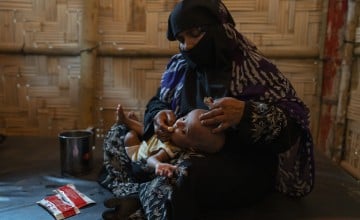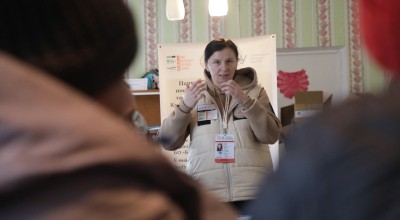
Read our 2024 annual report

Knowledge Hub
Ismat Ara, a 42-year-old mother of two daughters, resides with her family in a refugee camp after fleeing Myanmar. This is her story.
Navigating life as one of hundreds of thousands of refugees in the world's biggest camp is challenging beyond belief, which makes the resilience of Ismat Ara* all the more remarkable.
Ismat is a 42-year-old mother of two young girls, who was forced to flee her home in Myanmar a number of years ago as part of the influx of Rohingya Muslims to Cox's Bazar in Bangladesh.
The days when they owned their own home surrounded by trees in Myanmar are a distant memory to Ismat and her husband who, at 55, is paralysed and unable to work.
When Ismat arrived at the camp, she and her husband had a one-year-old daughter. Tragically, she experienced the loss of two more children during pregnancy before the birth of her daughter Ashmita*.
With her husband unable to support his wife and children due to his medical condition, Ismat struggled to keep her young family going. Little Ashmita became severely malnourished.
"They identified my child as severely malnourished"

Support from volunteers at a Concern-run nutrition centre meant that Ismat was able to get Ashmita the treatment she needed.
“Volunteers went to our houses and talked with us, and after that, I came to the nutrition centre. I came here and collected the token," Ismat tells us.
"After attending the health session, they took measurements of my child's weight, height, and other measures.
"They identified my child as severely malnourished. At admission, my child's weight was 3.5kg at six months of age, but now my child's weight is 4.2kg.”
Ismat did all she could to bring her baby back to health, engaging with the team at the nutrition centre and educating herself on the best ways to nurse Ashmita and also guard against disease entering their home.
“They gave me lessons to stay hygienic and advised me to give my children one pack of ready-to-use supplementary food twice a day. My child's health has improved now. My child used to cry a lot and slept less. She seemed very anxious, but now she is normal.”
The difficulty of daily life in the camp
While Ismat has been able to provide some peace of mind for herself and her family and the threat of going hungry has diminished, security within the camp continues to trouble her on a daily basis.
Cox's Bazar is prone to flooding during Bangladesh's monsoon season between June and October, while the cramped conditions of the camp also leave these structures vulnerable to fires.
Between January 2021 and December 2022 alone, there were over 220 fires in the camps. A blaze in January 2024, dubbed by the Australian Broadcasting Corporation “the fire the world ignored,” destroyed 800 homes and left over 7,000 Rohingya homeless. Many Rohingya have lost their homes multiple times since the crisis began in 2017.
Crime is also a factor among the population in Cox's Bazar, with robberies and kidnappings not unheard of.
Ismat's determination to make the best possible life for her family shines through, but her struggles - and the struggles of thousands of other mothers in the camps - continue.
“I want to feed my children good food. I want to raise [them] properly," she insists, defiantly.
"[But] I have two pairs of clothes for my daughter. I cannot buy any clothes for her. I use an old mosquito net for my daughter, which has a lot of holes. I only get rice, oil, lentils, eggs, onion, and garlic. This is not sufficient for us.
"We cannot buy any food. Yesterday we ate rice with egg and lentils. We cannot buy any meat.
"We receive a limited food ration now. We accept 13kg of rice for one person. Now, we receive fewer lentils and oil than before. I fear that if my child goes out, she can be kidnapped by someone. I also think about how long it will take to make my children fully healthy.”
*Names have been changed for security reasons
Our impact in 2024
people reached through our emergency response
people reached through our health interventions
people reached through our livelihoods programmes




